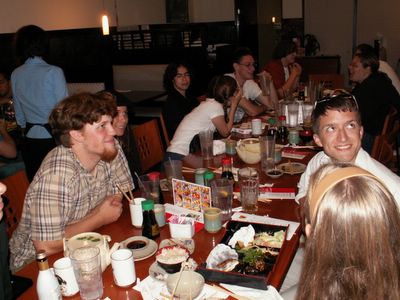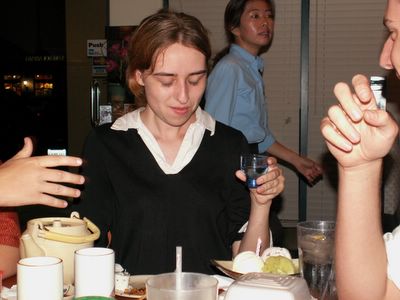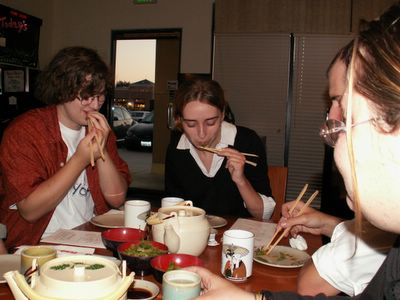9.27.2005
9.18.2005
9.08.2005
Lucretius
My seminar on Lucretius tonight was much better than I first expected. The reading was fairly boring, and didn’t seem like it would have a great amount of interesting discussion material. Lucretius’ work is titled “On the Nature of Things.” Not a promising beginning. My roommate wasn’t joking when he said that he fell asleep five times in a day reading it.
However, once we were actually in class, we had a long thought-provoking discussion on what Lucretius views of the world were and what sort of philosophy they led to. Hs work, while some consider it is written in a poetic style, is somewhat of a combination of science and philosophy. He begins by proving that nothing beyond matter is necessary for the day-to-day actions we observe, and so concludes from that that the gods therefore do not exist.
From this he infers the uselessness of all religions, and actually demonstrates, using examples like Agamemnon’s offering of his daughter, that religions are evil, because they cause pain, which is his last standard of that which is bad. For since there is no afterlife, he encourages everyone to seek pleasure and avoid pain to the utmost extent, and argues that this is our true nature, and the reason we establish civilizations and laws is in order to mutually agree to try to have the least pain possible.
The discussion was especially heated when we discussed the last few paragraphs of Book III, which summed up his depressing philosophy, because Mr. Shelmetzy had actually subscribed to this sort of viewpoint for most of his life, and argued very well to defend it’s rationality, even though he conceded it was wrong.
“Wilt thou then hesitate and think it a hardship to die? Thou for whom life is well nigh dead whilst yet thou livest and seest the light, who spendest the greater part of thy time in sleep and snorest wide awake and ceasest not to see visions and hast a mind troubled with groundless terror and canst not discover often what it is that ails thee, when besotted man thou art sore pressed on all sides with full many cares and goest astray tumbling about in the wayward wanderings of the mind…A sure term of life is fixed for mortals, and death cannot be shunned, but meet it we must. Moreover we are ever engaged, ever involved in the same pursuits, and no new pleasure is struck out by living on; but whilst what we crave is wanting, it seems to transcend all the rest; then, when it has been gotten, we crave something else, and ever does the same thirst of life possess us, as we gape for it open mouthed. Quite doubtful it is that the future will carry with it or what chance will bring us or what end is at hand. Nor by prolonging life do we take one tittle from the time past in death nor can we fret anything away, whereby we may be haply be a less long time in the condition of the dead. Therefore you may complete as many generations as you plese during your life; none the less however will that everlasting death await you; and for no less long a time will he be no more in being, who beginning with today has ended his life, than the man who died many months and years ago.”
“I thought that is awesome.” – Mr. Shelmetzy
“Awesome, or insanely depressing?!” Miss Cross
“It’s depressing now, but once you’re dead you won’t be depressed anymore.” Miss Kuenstel
After discussing those and related paragraphs, we moved back to he beginnings, and examined his pseudo-scientific inquiry into the makings of stuff, trying to make sense of his talk about “atoms falling through a void” and his non-account of the first mover. This led into a very interesting discussion about fate and free will, and the different definitions of free will, the view of it as indeterminacy as opposed to the view of free will as the ability to choose.
I actually talked more with Mr. Shelmetzy and Mr. Collins after class about this, and we brought up some stuff about quantum theory and modern physics, and were surprised at how similar the views of Ancient Romans and many modern day physicists and philosophers are.
We always hear the discord and strife between those who say, “I commend enjoyment, for man has no good thing under the sun but to eat and drink and enjoy himself,” (Ecc. 8:15) and those who proclaim, “Fear God, and keep His commandments, for this is the whole duty of man.” (Ecc. 12:13)
But in the end, “What has been, is what will be, and what has been done, is what will be done; and there is nothing new under the sun.” (Ecc. 1:9)
However, once we were actually in class, we had a long thought-provoking discussion on what Lucretius views of the world were and what sort of philosophy they led to. Hs work, while some consider it is written in a poetic style, is somewhat of a combination of science and philosophy. He begins by proving that nothing beyond matter is necessary for the day-to-day actions we observe, and so concludes from that that the gods therefore do not exist.
From this he infers the uselessness of all religions, and actually demonstrates, using examples like Agamemnon’s offering of his daughter, that religions are evil, because they cause pain, which is his last standard of that which is bad. For since there is no afterlife, he encourages everyone to seek pleasure and avoid pain to the utmost extent, and argues that this is our true nature, and the reason we establish civilizations and laws is in order to mutually agree to try to have the least pain possible.
The discussion was especially heated when we discussed the last few paragraphs of Book III, which summed up his depressing philosophy, because Mr. Shelmetzy had actually subscribed to this sort of viewpoint for most of his life, and argued very well to defend it’s rationality, even though he conceded it was wrong.
“Wilt thou then hesitate and think it a hardship to die? Thou for whom life is well nigh dead whilst yet thou livest and seest the light, who spendest the greater part of thy time in sleep and snorest wide awake and ceasest not to see visions and hast a mind troubled with groundless terror and canst not discover often what it is that ails thee, when besotted man thou art sore pressed on all sides with full many cares and goest astray tumbling about in the wayward wanderings of the mind…A sure term of life is fixed for mortals, and death cannot be shunned, but meet it we must. Moreover we are ever engaged, ever involved in the same pursuits, and no new pleasure is struck out by living on; but whilst what we crave is wanting, it seems to transcend all the rest; then, when it has been gotten, we crave something else, and ever does the same thirst of life possess us, as we gape for it open mouthed. Quite doubtful it is that the future will carry with it or what chance will bring us or what end is at hand. Nor by prolonging life do we take one tittle from the time past in death nor can we fret anything away, whereby we may be haply be a less long time in the condition of the dead. Therefore you may complete as many generations as you plese during your life; none the less however will that everlasting death await you; and for no less long a time will he be no more in being, who beginning with today has ended his life, than the man who died many months and years ago.”
“I thought that is awesome.” – Mr. Shelmetzy
“Awesome, or insanely depressing?!” Miss Cross
“It’s depressing now, but once you’re dead you won’t be depressed anymore.” Miss Kuenstel
After discussing those and related paragraphs, we moved back to he beginnings, and examined his pseudo-scientific inquiry into the makings of stuff, trying to make sense of his talk about “atoms falling through a void” and his non-account of the first mover. This led into a very interesting discussion about fate and free will, and the different definitions of free will, the view of it as indeterminacy as opposed to the view of free will as the ability to choose.
I actually talked more with Mr. Shelmetzy and Mr. Collins after class about this, and we brought up some stuff about quantum theory and modern physics, and were surprised at how similar the views of Ancient Romans and many modern day physicists and philosophers are.
We always hear the discord and strife between those who say, “I commend enjoyment, for man has no good thing under the sun but to eat and drink and enjoy himself,” (Ecc. 8:15) and those who proclaim, “Fear God, and keep His commandments, for this is the whole duty of man.” (Ecc. 12:13)
But in the end, “What has been, is what will be, and what has been done, is what will be done; and there is nothing new under the sun.” (Ecc. 1:9)
Subscribe to:
Posts (Atom)












